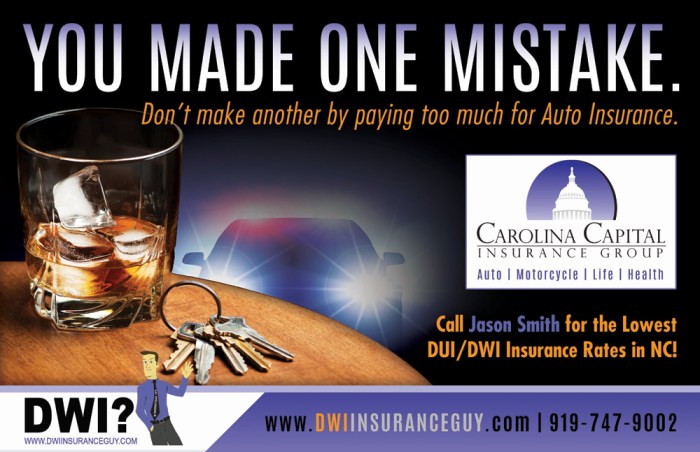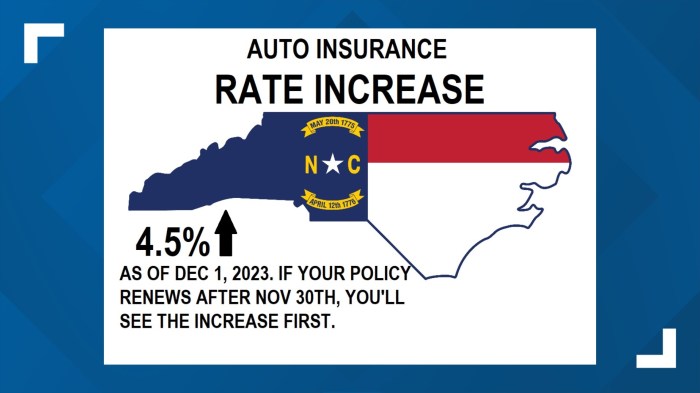
Securing the right auto insurance in North Carolina can feel like navigating a complex maze. Understanding the state’s specific requirements, the factors influencing premiums, and the process of filing a claim are crucial for every driver. This guide aims to demystify the process, providing clear explanations and practical advice to help you make informed decisions about your NC auto insurance.
From understanding minimum liability coverage and the penalties for driving uninsured to selecting the right provider and filing a claim effectively, we cover all aspects of NC auto insurance. We’ll explore the impact of factors like driving history, age, and credit score on your premiums, and offer strategies to potentially lower your costs. Ultimately, our goal is to empower you with the knowledge needed to protect yourself and your finances on North Carolina roads.
Understanding North Carolina Auto Insurance Requirements

Driving in North Carolina requires you to carry a minimum amount of auto insurance. Understanding these requirements is crucial to avoid penalties and ensure you’re adequately protected in case of an accident. This section will detail the state’s minimum coverage, potential penalties for non-compliance, and the various types of coverage options available.
Minimum Liability Coverage Requirements in North Carolina
North Carolina mandates minimum liability insurance coverage of 30/60/25. This means you must carry at least $30,000 in bodily injury liability coverage per person injured in an accident you cause, $60,000 in total bodily injury liability coverage per accident, and $25,000 in property damage liability coverage. This coverage protects others if you are at fault in a car accident. It does *not* cover your own vehicle or medical expenses.
Penalties for Driving Without Insurance in NC
Driving without the legally required insurance in North Carolina carries significant consequences. These penalties can include fines, license suspension, and even vehicle impoundment. The exact penalties vary depending on the circumstances and the number of offenses, but they can be substantial and impact your driving record. Furthermore, being uninsured leaves you personally liable for any damages or injuries caused in an accident, potentially leading to significant financial hardship.
Types of Auto Insurance Coverage
Several types of auto insurance coverage are available beyond the state-mandated minimum liability. Understanding these options can help you choose the best coverage for your needs and budget.
- Liability Insurance: As previously discussed, this covers bodily injury and property damage to others if you are at fault in an accident.
- Collision Coverage: This covers damage to your vehicle regardless of fault. If you’re involved in an accident, collision coverage will pay for repairs or replacement, even if you caused the accident.
- Comprehensive Coverage: This covers damage to your vehicle caused by events other than collisions, such as theft, vandalism, fire, or hail.
- Uninsured/Underinsured Motorist Coverage: This protects you if you’re involved in an accident with an uninsured or underinsured driver. It covers your medical expenses and vehicle damage.
- Medical Payments Coverage (Med-Pay): This covers your medical expenses, regardless of fault, after an accident.
Cost Comparison of Minimum vs. Higher Coverage Levels in NC Cities
The cost of auto insurance varies significantly depending on location, driving history, age, and the type and level of coverage selected. The following table provides a *general* comparison – actual costs will vary based on individual circumstances. These figures are estimates and should not be considered exact quotes. Always contact multiple insurance providers for personalized quotes.
| City | Minimum Coverage (30/60/25) (Estimate) | Higher Coverage (100/300/100) (Estimate) | Comprehensive & Collision Added (Estimate) |
|---|---|---|---|
| Charlotte | $500-$700 annually | $800-$1200 annually | $1200-$1800 annually |
| Raleigh | $450-$650 annually | $750-$1100 annually | $1100-$1700 annually |
| Greensboro | $400-$600 annually | $700-$1000 annually | $1000-$1600 annually |
| Asheville | $550-$800 annually | $900-$1300 annually | $1300-$2000 annually |
Factors Affecting NC Auto Insurance Premiums
Understanding the factors that influence your North Carolina auto insurance premium is crucial for securing affordable coverage. Insurance companies use a complex formula to assess risk and determine your rate, considering various aspects of your profile and driving habits. This ensures that premiums accurately reflect the likelihood of you filing a claim.
Key Factors Determining Insurance Premiums
Several key factors significantly impact your North Carolina auto insurance premium. These factors are carefully weighed by insurance companies to assess the risk associated with insuring you. Age, driving history, the type of vehicle you drive, your location, and even your credit score all play a role.
The Impact of Credit Score on Insurance Rates
In North Carolina, as in many other states, your credit score can influence your auto insurance premium. Insurance companies often use credit-based insurance scores to help predict the likelihood of a claim. A higher credit score generally correlates with lower premiums, while a lower score may result in higher premiums. This is because individuals with better credit histories tend to demonstrate greater financial responsibility, which is seen as a lower risk for insurance companies. The exact impact varies by insurer, but it’s a significant factor to consider.
Premium Rates Across Different Age Groups
Insurance premiums in North Carolina vary considerably across different age groups. Younger drivers, typically those under 25, often face higher premiums due to statistically higher accident rates within this demographic. Insurance companies perceive this group as higher risk. Conversely, older drivers, typically those over 65, may see lower premiums, as their accident rates tend to be lower. Mid-range age groups generally fall somewhere in between. It’s important to note that individual driving records will further refine these general trends. For example, a young driver with a spotless record might receive a lower premium than an older driver with multiple accidents.
Ways to Reduce Auto Insurance Premiums
Several strategies can help North Carolina drivers reduce their auto insurance premiums. Proactive measures to improve your driving record and financial profile can lead to significant savings.
- Maintain a clean driving record: Avoid accidents and traffic violations. Each incident increases your risk profile and, consequently, your premiums.
- Improve your credit score: A higher credit score can lead to lower insurance rates. Focus on paying bills on time and managing your debt effectively.
- Choose a safe vehicle: Some vehicles are statistically safer than others, leading to lower insurance premiums. Consider safety ratings when selecting a car.
- Bundle your insurance policies: Many insurers offer discounts for bundling auto insurance with other types of insurance, such as homeowners or renters insurance.
- Take a defensive driving course: Completing a defensive driving course can demonstrate your commitment to safe driving and may qualify you for discounts.
- Shop around for insurance: Compare quotes from multiple insurers to find the best rates for your specific needs and profile.
- Consider higher deductibles: Choosing a higher deductible can lower your premiums, but remember that you’ll pay more out-of-pocket in the event of a claim.
Filing a Claim with NC Auto Insurance
Filing an auto insurance claim in North Carolina can seem daunting, but understanding the process can make it significantly smoother. This section Artikels the steps involved, the necessary documentation, the adjuster’s role, and how to handle potential disputes. Remember, prompt action and clear communication are key to a successful claim.
The Claim Filing Process
After an accident, immediately contact the police to file a report, especially if there are injuries or significant property damage. Next, notify your insurance company as soon as possible, usually within 24-48 hours, as Artikeld in your policy. You’ll typically provide initial details about the accident, including the date, time, location, and individuals involved. Your insurer will then assign a claims adjuster to your case. The adjuster will investigate the accident, assess the damages, and determine the liability. Following the investigation, a settlement offer will be made, which you can accept or negotiate.
Gathering Necessary Documentation
Comprehensive documentation is crucial for a successful claim. This includes the police report (if applicable), photos and videos of the accident scene and vehicle damage, contact information for all parties involved, including witnesses, and any medical records or bills related to injuries sustained. Copies of your driver’s license, vehicle registration, and insurance policy are also essential. Maintaining a detailed record of all communication with your insurance company, including dates, times, and the names of individuals you spoke with, is highly recommended.
The Role of the Insurance Adjuster
The insurance adjuster acts as an investigator for your insurance company. Their role is to gather information about the accident, assess the extent of the damage, determine liability, and ultimately decide on the appropriate settlement amount. Adjusters will often request documentation from you and may conduct interviews with involved parties and witnesses. It’s important to cooperate fully with the adjuster and provide them with all the necessary information in a timely manner. They are responsible for evaluating your claim and deciding whether it’s valid and how much your insurance company should pay.
Handling Disputes with the Insurance Company
Disputes can arise if you disagree with the adjuster’s assessment of liability or the amount of the settlement offer. First, review your policy carefully to understand your coverage and rights. Then, attempt to resolve the dispute through direct communication with your adjuster or their supervisor. If this fails, you may need to consider seeking assistance from a lawyer specializing in insurance claims. North Carolina has specific regulations regarding insurance claims, and legal counsel can help navigate the process and protect your rights. Filing a formal complaint with the North Carolina Department of Insurance may also be an option if you’re unable to reach a satisfactory resolution.
Illustrative Scenarios of NC Auto Insurance Claims

Understanding how North Carolina auto insurance claims are handled is crucial for policyholders. This section provides two illustrative scenarios, one involving a collision and the other a comprehensive claim, to clarify the process from incident to settlement.
Collision Claim Scenario: Rear-End Collision
A 2018 Honda Civic, driven by Ms. Sarah Miller, was stopped at a red light when it was rear-ended by a 2021 Ford F-150 driven by Mr. John Davis. The impact caused significant damage to the rear of the Civic, including a crushed bumper, damaged taillights, and a dented trunk. The F-150 sustained minor damage to its front bumper. Ms. Miller experienced whiplash and required medical attention, resulting in a visit to the emergency room and follow-up visits with a chiropractor.
Following the accident, both drivers exchanged information and contacted the police, who filed a report citing Mr. Davis as at-fault for following too closely. Ms. Miller then contacted her insurance company, State Farm, to report the claim. State Farm assigned an adjuster who inspected both vehicles, reviewed the police report, and obtained medical records documenting Ms. Miller’s injuries. The adjuster determined the cost to repair Ms. Miller’s Civic was $5,000, and her medical bills totaled $3,000. State Farm also investigated Mr. Davis’s insurance coverage with Geico. Geico acknowledged liability, and after negotiations between the two insurance companies, State Farm settled the claim with Ms. Miller for the full cost of repairs and medical expenses, totaling $8,000. The settlement included a reimbursement for her deductible.
Comprehensive Claim Scenario: Vehicle Theft
Mr. Robert Lee’s 2020 Toyota Camry was stolen from his driveway overnight. He reported the theft to the local police department and immediately contacted his insurance provider, Nationwide. Nationwide initiated an investigation, requiring Mr. Lee to provide a police report, vehicle identification number (VIN), and proof of ownership. The investigation included checking for any signs of forced entry or other suspicious activity at the scene. After confirming the theft, Nationwide determined the actual cash value (ACV) of Mr. Lee’s vehicle to be $18,000, considering its age, mileage, and condition. Mr. Lee had a comprehensive policy with a $500 deductible. Nationwide processed the claim, and after deducting the deductible, Mr. Lee received a check for $17,500. This covered the cost of replacing his stolen vehicle.
Final Review

Successfully navigating the world of NC auto insurance requires a proactive approach and a thorough understanding of your options. By carefully considering the factors affecting your premiums, comparing providers, and understanding the claims process, you can ensure you have the right coverage at the best possible price. Remember, the right insurance isn’t just about meeting minimum requirements; it’s about safeguarding your financial future and providing peace of mind on the road. This guide serves as a starting point – always consult directly with insurance professionals for personalized advice.
Clarifying Questions
What happens if I get into an accident and I don’t have insurance?
Driving without insurance in North Carolina is illegal and carries significant penalties, including fines, license suspension, and potential vehicle impoundment. You’ll also be responsible for all accident-related costs.
How often can I change my auto insurance provider?
You can generally switch providers at any time. Most policies allow for cancellation with a short notice period, although you may incur a penalty depending on your policy terms.
Can I get my insurance cancelled for multiple minor accidents?
While a single minor accident may not lead to cancellation, multiple accidents within a short period could cause your insurer to increase your premiums significantly or even cancel your policy. Your driving record is a key factor in determining your insurance rates.
What is the difference between collision and comprehensive coverage?
Collision coverage pays for damage to your vehicle caused by an accident, regardless of fault. Comprehensive coverage protects against damage from events other than collisions, such as theft, vandalism, or weather-related incidents.